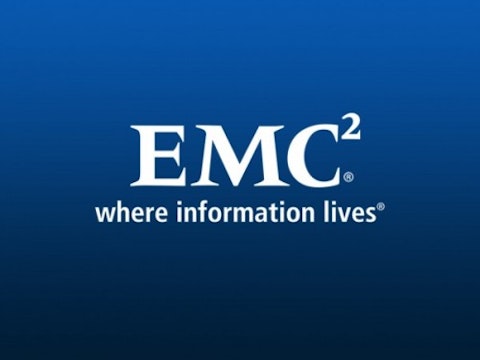EMC Corporation (NYSE:EMC) is usually thought of as an information storage provider. While information storage still represents two-thirds of the company’s revenues, EMC touts its competitive position at “the intersection of cloud and big data.”
Not only does EMC offer a broad portfolio of enterprise storage solutions including backup and recovery, but the company also has leading information security technology through its RSA subsidiary and virtual computing technology through its majority ownership in VMware, Inc. (NYSE:VMW). In combination, EMC’s businesses provide a unique and comprehensive set of solutions to store, access, and analyze data securely both in the office and in the cloud.

Enterprise information technology demands continue to grow worldwide. This includes increased storage needs, the ability to analyze data to drive better business decisions and improve efficiency, security and compliance software to protect critical systems and information, and the ability to access information remotely through virtualization technology. EMC Corporation (NYSE:EMC) has leading products in each of these categories, which provides diverse streams of revenue and the competitive advantage of being able to integrate these products and bundle them to customers.
With a successful suite of products and a growing market opportunity driven by the ongoing information and mobile computing revolution, EMC is in a fantastic position to continue to grow into the future. To make the thesis even more compelling, EMC trades at a bargain valuation compared to its peers as summarized below:
| EMC | VMW | TDC | SYMC | RAX | |
| CAPS rating (out of five stars) | 5 stars | 4 stars | 5 stars | 3 stars | 3 stars |
| Share price | $23.25 | $73.55 | $58.56 | $23.70 | $56.11 |
| Market capitalization (in billions) | $49.0 | $31.5 | $9.8 | $16.3 | $7.7 |
| Revenue (in billions) | $21.7 | $4.6 | $2.7 | $6.8 | $1.3 |
| TTM Price to sales ratio | 2.26 | 6.84 | 3.64 | 2.40 | 5.87 |
| TTM Price to earnings ratio | 17.93 | 42.76 | 24.00 | 15.20 | 74.81 |
| Forward price to earnings ratio | 12.50 | 20.10 | 16.64 | 12.33 | 42.19 |
| PEG ratio | 0.94 | 1.05 | 1.34 | 1.65 | 1.93 |
| Free cash flow yield | 10.2% | 5.3% | 4.3% | 10.4% | 1.6% |
| Debt to equity ratio | 0.07 | 0.08 | 0.15 | 0.41 | 0.10 |
| Net cash* on balance sheet (in billions) | $4.5 | $1.2 | $0.5 | $1.1 | $0.2 |
| * Net cash defined as cash plus short term investments less long-term debt | |||||
| Sources: Motley Fool CAPS and Yahoo! Finance – March 2 | |||||
Peer comparison
While no company has quite the unique suite of businesses as EMC, pure-play data warehouse and analytics provider Teradata Corporation (NYSE:TDC), security provider Symantec Corporation (NASDAQ:SYMC), and cloud computing operator Rackspace Hosting, Inc. (NYSE:RAX) provide some context on how the market values businesses in this sector.
It is well known that the growth potential of cloud computing has driven prices of companies like Rackspace and VMware to sky-high multiples. However, VMware, Inc. (NYSE:VMW)’s share price has stumbled to 52-week lows on concerns regarding slowdown in licensing and revenue growth of “only” 22% during 2012. From a valuation standpoint, VMware stands out over Rackspace in terms of free cash flow generation and PEG ratio (which is based on analysts’ growth estimates).
The investment thesis for EMC is approximately one half an investment in VMware and one half an investment in EMC’s information storage, analytics, and security businesses. Consider this: EMC’s ownership of approximately 80% of VMware is currently valued at $25 billion based on VMware’s recent share price; with EMC’s total market capitalization of $48 billion, the market is valuing EMC’s information storage and RSA security businesses at just $23 billion despite the company’s non-VMware revenue reaching almost $17 billion in 2012. For reference, this is a price to sales multiple of around 1.4, which is significantly lower than both Teradata and Symantec. Additionally, EMC’s PEG ratio is dramatically lower than these peers because EMC has the best of both worlds with the growth potential of Teradata with the solid profitability of Symantec.
Risks to the thesis
As with any company, EMC has its share of risks. For starters, VMware’s efforts to expand its offerings from virtualization to more comprehensive cloud services is not without risk; competitors like Rackspace and Amazon.com, Inc. (NASDAQ:AMZN) have a head start and will prove to be formidable competitors. While top line growth of 22% in 2012 is impressive, this does represent a sizable slowdown from previous years, including VMware’s revenue growth of 32% in 2011.
The demand for IT security is a bit of a double-edged sword; high-profile attacks on corporations are becoming a daily occurrence. While this highlights the importance of the products offered by RSA and drives demand, security failures have occurred in the past on RSA’s watch on more than one occasion.
Another factor to monitor is the price/volume dynamic in EMC’s core “big data” information business. Volumes have been growing faster than prices have been declining on a per unit basis, so growth has been solid in recent years. However, the continued commoditization of storage and cloud services may put pressure on growth at the top and bottom lines going forward.
EMC is a buy
After touching a 52-week low last week while the market was reaching new five-year highs, EMC has clearly fallen out of favor in the market. While there are valid concerns regarding slowing growth, the case for EMC is strong based on the combination of a compelling valuation and long-term business trends that EMC is well positioned to seize. Quite simply, data warehousing and analytics, IT security, and cloud computing are not going away. In fact, many argue that we’re just at the beginning of the information revolution, which provides plenty of room to grow in the future.
The article The Intersection of Cloud and Big Data … And Investing Opportunity originally appeared on Fool.com and is written by Brian Shaw.
Copyright © 1995 – 2013 The Motley Fool, LLC. All rights reserved. The Motley Fool has a disclosure policy.





